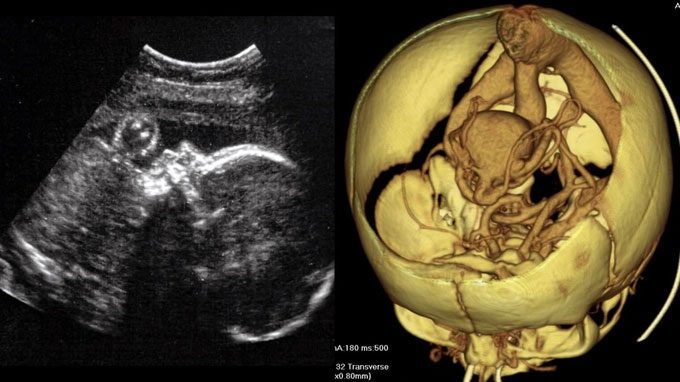A fetus with a rare congenital defect underwent brain surgery by doctors to correct a malformed blood vessel, and the baby was born healthy.
The fetus affected by Vascular Occlusive Glomerulopathy Malformation (VOGM) causes certain arteries in the brain to fail to connect with capillaries, resulting in branching, fragile blood vessels that reduce blood flow.
At the same time, it causes arteries to transport blood into veins at the base of the brain, leading to high-pressure circulation.

In fetuses with the rare defect known as Galen vein malformation (VOGM), certain arteries in the brain connect directly to veins instead of capillaries (Image: Wikimedia Commons).
This can lead to congestive heart failure, high blood pressure in the pulmonary arteries (pulmonary hypertension), brain tissue damage, and the development of hydrocephalus (enlarged head).
In a report published on May 4 in the journal Stroke, doctors at Boston Children’s Hospital and Brigham and Women’s Hospital described a surgical method to correct the malformation in fetuses before birth.
The study aimed to find new treatment methods for Galen vein malformation (VOGM), a rare abnormality affecting blood vessels that carry oxygenated blood from the heart to the brain.
Earlier, in mid-March 2023, doctors performed this method on a pregnant woman as part of a clinical trial for the study.
Kenyatta Coleman was diagnosed with a fetus suffering from VOGM during an ultrasound at 30 weeks of gestation, and she underwent a “uterine” procedure when the fetus was 34 weeks and 2 days old.
Two days after the procedure, Kenyatta Coleman began to experience a rupture of membranes and successfully gave birth via normal delivery.
The baby was completely healthy and was named Denver Coleman.
Notably, since then, baby Denver has not required any medication or further surgical treatment.
Kenyatta Coleman, the baby’s mother, emotionally shared with CNN: “The first time I heard my baby cry, my happiness was indescribable when I saw her born healthy. That was the most beautiful moment of my life.”
Dr. Darren Orbach, a physician at Boston Children’s Hospital who participated in the surgery, stated: “We are pleased to report that at six weeks, the baby is progressing very well, has no need for medication, is feeding normally, gaining weight, and has returned home without any negative signs affecting the brain.”
Dr. Orbach explained: “This is the first patient treated with this method, and it is important that we continue testing to evaluate safety and efficacy in other children.
We have repaired the defect and prevented heart failure in the fetus before birth instead of trying to reverse it after the baby is born.”
According to estimates from the American Heart Association (AHA), the incidence of VOGM in fetuses is 1 in 60,000 births, categorizing it as a very rare congenital defect.
Typically, the treatment for this issue involves blocking the connections between arteries and veins in the malformation after the baby is born.
However, this is not always successful, and it may sometimes be too late to prevent brain damage that could lead to disability or threaten the child’s life.


















































